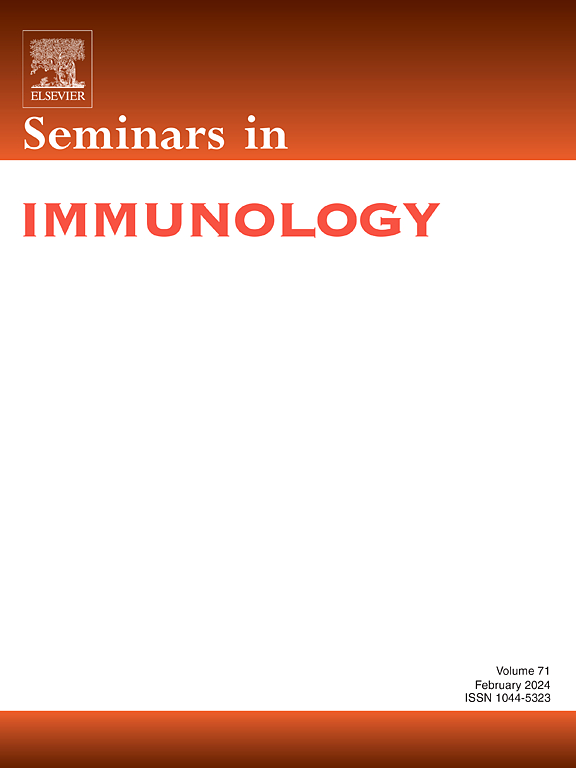Oncolytic virus-mediated immunomodulation in glioblastoma: Insights from clinical trials and challenges
IF 7.4
2区 医学
Q1 IMMUNOLOGY
引用次数: 0
Abstract
The pivotal involvement of the host immune system in cancer therapy has dramatically reshaped therapeutic paradigms, inaugurating the era of immunotherapy. Nonetheless, antigen-specific immunotherapies encounter substantial hurdles within the highly immunosuppressive microenvironment of glioblastoma (GBM), which thwarts antitumor T-cell immunity. Oncolytic viruses (OVs), a form of immunotherapy that inflames the GBM microenvironment, have been subject to clinical evaluation, yielding promising outcomes. Evidence increasingly indicates that OVs can modify the GBM microenvironment from an immunosuppressive to an immune active state, facilitating enhanced antitumor responses. Clinical trials demonstrate that oncolytic virotherapy is generally well-tolerated, generating data about its immune-activating effects. "Window of opportunity" trials provide insights into viral replication, pre-existing immunity, and delivery methods. However, constraints in post-treatment sampling may impede comprehensive analyses of the virotherapy-induced biological and immunological changes. This review discusses current advancements and persistent challenges in GBM trials involving OVs.
胶质母细胞瘤中溶瘤病毒介导的免疫调节:来自临床试验和挑战的见解
宿主免疫系统在癌症治疗中的关键作用极大地重塑了治疗范式,开创了免疫治疗的时代。尽管如此,抗原特异性免疫疗法在胶质母细胞瘤(GBM)的高度免疫抑制微环境中遇到了实质性障碍,这阻碍了抗肿瘤t细胞免疫。溶瘤病毒(OVs)是一种使GBM微环境发炎的免疫疗法,已经进行了临床评估,产生了有希望的结果。越来越多的证据表明,OVs可以将GBM微环境从免疫抑制状态改变为免疫活性状态,促进抗肿瘤反应的增强。临床试验表明,溶瘤病毒治疗通常耐受良好,产生了有关其免疫激活作用的数据。“机会之窗”试验提供了对病毒复制、预先免疫和递送方法的深入了解。然而,治疗后采样的限制可能会阻碍对病毒治疗诱导的生物学和免疫学变化的全面分析。本综述讨论了涉及OVs的GBM试验的当前进展和持续挑战。
本文章由计算机程序翻译,如有差异,请以英文原文为准。
求助全文
约1分钟内获得全文
求助全文
来源期刊

Seminars in Immunology
医学-免疫学
CiteScore
11.40
自引率
1.30%
发文量
50
审稿时长
89 days
期刊介绍:
Seminars in Immunology is a specialized review journal that serves as a valuable resource for scientists in the field of immunology. The journal's approach is thematic, with each issue dedicated to a specific topic of significant interest to immunologists. It covers a wide range of research areas, from the molecular and cellular foundations of the immune response to the potential for its manipulation, highlighting recent advancements in these areas.
Each thematic issue is curated by a guest editor, who is recognized as an expert in the field internationally. The content of each issue typically includes six to eight authoritative invited reviews, which delve into various aspects of the chosen topic. The goal of these reviews is to provide a comprehensive, coherent, and engaging overview of the subject matter, ensuring that the information is presented in a timely manner to maintain its relevance.
The journal's commitment to quality and timeliness is further supported by its inclusion in the Scopus database, which is a leading abstract and citation database of peer-reviewed literature. Being indexed in Scopus helps to ensure that the journal's content is accessible to a broad audience of researchers and professionals in immunology and related fields.
 求助内容:
求助内容: 应助结果提醒方式:
应助结果提醒方式:


